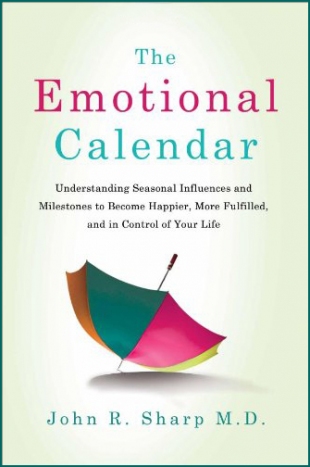John Sharp is a psychiatrist and neuropsychiatrist who serves on the medical staff at the Beth Israel Deaconess Medical Center in Boston. He is on the faculty at Harvard Medical School and at the David Geffen School of Medicine at UCLA and divides his time between Boston and Los Angeles. In this lively and illuminating book, Sharp examines the environmental, psychological, and cultural forces that cause people stress during one of the four seasons, hot-spot holidays, or on special days connected to terrible things that happened in the past. He then discusses ways in which these "emotional calendars" can be dealt with and handled properly.
Sharp begins with a quotation from Yoko Ono's "Season of Glass:"
Spring passes and one remembers one's innocence.
Summer passes and one remembers one's exuberance.
Autumn passes and one remembers one's reverence.
Winter passes and one remembers one's perseverance.
This poetic ditty is a prelude to Sharp's delineation of each of the seasons. He sees summer as a "a supercharged time." Many people have high expectations about this laid-back time of year where joy and freedom prevail. Some people yearn for a more relaxing lifestyle but given the experience of "doing nothing" are quickly bored and dissatisfied. Summer can adversely affect others with its heat, its light, and its invitations to sexual promiscuity.
The crisp, fresh air of autumn signals a return to school (a hot-spot issue for some). The pace quickens and more deadlines bring added stress. Some people have trouble handling the holiday of Thanksgiving with its traditional values and rituals.
Winter takes its toll on many with its cold, its Christmas holiday, and its dark days (which brings on SAD — seasonal affective disorder). Our exhausted bodies struggle valiantly to ward off colds and flu.
Spring rolls in with a merry blend of sun and warmth. Many experience spring fever and are not able to focus their attention on anything but going outside to savor the energy in the earth and in their bodies. Others cannot appreciate these bounties since they are overwhelmed by spring allergies.
Winds, floods, and storms impact our emotions and moods. Climate change has already affected millions in 2011 with a very hot summer and a very cold and stormy winter. Sharp points out that many who live through hurricanes, floods, tornados, and landslides suffer flashbacks to the traumatic situations they faced. Viewing extreme weather with equanimity is a sane and salutary policy.
Sharp mentions Garrison Keillor as one of the few entertainers to repeatedly talk about the weather and the different ways people respond to it. In the closing chapters of this breezy book, the author signals some strategies that have worked with his clients as they square off against emotional hot spots and seasonal turmoil.
